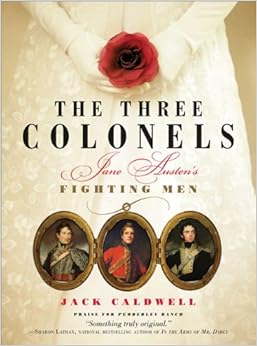Review: The Three Colonels: Jane Austen's Fighting Men, by Jack Caldwell
 |
| The Three Colonels: Jane Austen's Fighting Men by Jack Caldwell Sourcebooks Landmark | 365 pp 2012 |
By tweaking the period of Austen's novels ever so slightly, The Three Colonels brings our characters into wartime. Colonel Fitzwilliam (P&P) and Colonel Brandon (S&S) feature as two of the titular heroes, who are already ensconced with characters we know well - Anne de Bourgh and Marianne Dashwood, respectively. The third is a colonel Buford who is introduced as somewhat of a former rake, but who has fallen violently for Caroline Bingley. Readers will recall that Caroline does not have the most attractive of personalities, but Caldwell paints such a picture of her in his first few chapters that, by the end, one cannot help but like her entirely. And he does this not by creating a new persona, but by shining a light on the character we love to hate and providing a perspective not often viewed. Mary Bennet is given a similar treatment and, together, the two characters become justifiably readable.
Perhaps the most laudable aspect of Caldwell's treatment, however, is his portrayal of our antagonists. Distaste for Wickham is a given (and would be difficult to amend - although, yet again, I will reference "Lost in Austen" as an example of an attempt at that), but Caldwell takes it a step even further, making him somewhat more complex. George Wickham has never seen an honorable day in his life, but he seems even darker by this author's hand. I think even Jane Bingley could not find it within her to be sympathetic towards this version of him; and yet in the end of this book, one almost pities him. Similarly, Lady Catherine is naturally obtuse and condescending (and her treatment of her daughter here is despicable) and yet in the end you do almost feel a sort of compassion for her.
I think most adapting authors choose the road well-trodden where the line between good and evil hasn't just been already drawn, but is honored as Jane Austen canon. But in letting that line bleed a bit, and allowing some of those colors to mix, Jack Caldwell manages to refresh the story in a way wholly unseen before.
I love Colonel Fitzwilliam and Mary and their characters! Caroline, Lady Catherine and Wickham are in the hate list but make the story interesting. I will have to put this novel on my list to read.
ReplyDeleteThanks for taking the time to tell us about it!